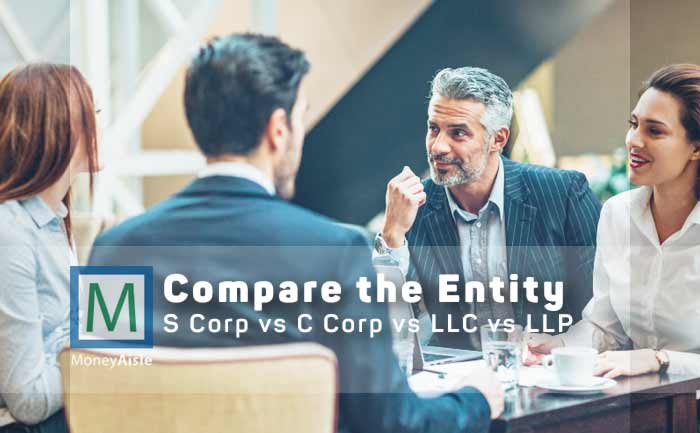The difference between S Corp vs C Corp vs LLC vs LLP is very significant in how your business is taxed, the amount of paperwork you have to deal with, and your personal liability, etc. Here you’ll learn side-by-side comparison between S Corp, C Corp, LLC, and LLP to take an informed decision for your startup.
So, it is very important for any startup to check:
- How the business is taxed.
- The amount of paperwork the business needs to deal with.
- Personal liability protection availability.
- And things like characteristics, benefits, and limitations of a business structure.
When it comes to setting up a business, choosing the best business structure is one of the most important factors to consider. Be it a C corp or S corp, an LLC or LLP, each entity has its own advantages and disadvantages. Learn the side-by-side comparison between S Corp, C Corp, LLC, and LLP to take an informed decision for your startup.
The type of business entity you choose will significantly impact business taxes, compliance requirements and paperwork, and liability protection against lawsuits and business liabilities.
Therefore, choosing the correct business entity is a critical decision. In this article, we’ll compare C corporations vs S corporations vs LLCs vs LLPs on seven characteristics that business owners look at while legally starting their business.
S Corp vs C Corp vs LLC vs LLP | Quick Comparison Table
| Characteristics | C Corp | S Corp | LLC | LLP |
| Limited Liability Protection | Yes | Yes | Yes | Yes |
| Formation Documents | Articles of Incorporation | Articles of Incorporation plus S Corporation Election on IRS form | Articles of Organization | Application for Registration of LLP |
| Tax Structure | Double Taxation | Pass-Through Tax | Flexibility to opt for any Tax Status | Pass-Through Tax |
| Paperwork and Compliance | Annual shareholder meeting, maintenance of meeting minutes, annual reports, etc | Annual shareholder meeting, maintenance of meeting minutes, annual reports, etc | LLC Annual report in some states | None |
| Management Structure | Board of directors and Managers | Board of directors and Managers | Can be member-managed or manager-managed | Managed by Partners |
| Ownership | No restriction | Up to 100 shareholders and all must be U.S residents/citizens | No restriction | At least 2 members, no maximum limit |
| Financing | Sale of stocks | Sale of stocks | LLC Loans and Grants | Small business loans and grants |
Let’s Learn in detail how the most famous business entities (LLC, S Corp, C corp, and LLP ) are different from each other. We hope you will be able to pick the right legal structure for your business when you finish reading.
Limited Liability Protection
Limited liability protection is the most important feature for which business owners convert their sole proprietorship or general partnership to an incorporated entity. Limited Liability Protection means that the business owners are not personally liable for the debts and liabilities of the business.
In simple words, if the business entity is sued or can’t pay its debts, the creditors can not go after the personal assets of the company’s owners.
C Corporation
A C corp offers limited liability protection to its owners, and the shareholders of a C corporation are not personally liable for the debts and liabilities of the business.
S Corporation
An S corp offers limited liability protection to its owners, and the shareholders of an S corporation are not personally liable for the debts and liabilities of the corporation.
LLC
A Limited Liability Company (LLC) offers limited liability protection to its owners, and the LLC members are not personally liable for the debts and liabilities of the LLC.
LLP
A Limited Liability Partnership (LLP) offers limited liability protection to its owners, and the LLP partners are not personally liable for the debts and liabilities of the LLP. However, LLPs receive less limited liability protection in many states than LLCs or corporations.
Formation Documents With the State
All four business entities must file formation documents with the state in which they are formed. However, the registration documents and requirements are different for each entity.
C Corporation
A C corporation is required to file articles of incorporation with the state authorities (mostly the secretary of state) with the filing fee and registered agent information. Other requirements vary from state to state.
S Corporation
An S corporation is required to file articles of incorporation. The articles of incorporation and submission requirements for S corp and C corp are the same. However, S corp also has to submit a request for an S election with the IRS.
LLC
An LLC is required to file articles of organization with the state. In many states, these LLC formation documents are also called certificates of organization or certificates of formation. All states require registered agent information and filing fee with additional requirements that vary from state to state.
Read the complete article on How to File LLC Articles of Organization in Any State. You can also read about 3 Must Have LLC Documents to efficiently set up an LLC.
LLP
An LLP is required to file an application for registration of a limited liability partnership with the state, along with partners’ names, registered agent information, and filing fee.
Tax Structure
The tax treatment of each type of business entity is different.
C Corporation
A C corporation is a separate legal entity from its owners, which means that the corporation itself is taxed on its profits. The corporation’s shareholders are then taxed again when they receive dividends from the corporation. This is known as “double taxation.”
S Corporation
An S corporation is a pass-through entity, like an LLC, which means that the business itself is not taxed. However, S corporations are subject to some particular rules and regulations.
LLC
An LLC offers the most flexible tax options. By default, an LLC is a pass-through entity, meaning the business itself is not taxed. Instead, the profits and losses of the company are “passed through” to the LLC members and taxed on their personal tax returns.
However, an LLC can also choose to be taxed as a corporation. Learn more about How LLCs are Taxed here. LLCs can also write off taxes and save a lot of money.
LLP
An LLP is a partnership, meaning the profits and losses of the business are “passed through” to the owners and taxed on their personal tax returns. However, LLPs are subject to some special rules and regulations.
Paperwork and Reporting Requirements
The amount of paperwork, formalities, and reporting required for each type of business entity is different.
C Corporation & S Corporation
Both S and C corporations are required to file more paperwork and have many stringent reporting requirements. For example, corporations are required to hold annual meetings and keep minutes of meetings.
In addition, corporations also need to file annual reports and fulfill compliance requirements.
LLC
LLCs are generally required to file fewer paperwork and reporting requirements than corporations. LLCs are not required to hold annual meetings or keep minutes of meetings. However, LLCs have to submit LLC annual reports and fee.
LLP
LLPs have the same filing and reporting requirements as general partnerships.
Management Structure
The management structure of each type of business entity is different.
C Corporation & S Corporation
Both S and C corporations are managed by the manager appointed by the board of directors. The shareholders elect the board of directors. Shareholders are the corporation owners and have voting rights to appoint a board of directors.
LLC
LLCs can be managed by either the members or the managers. Members are the owners of the LLC and have voting rights. Managers are either elected by the members or appointed by the LLC.
Read about Members-Managed vs Manager-Managed LLC here.
LLP
LLPs can be managed by either the partners or the managing partners. The duties of the LLP partners are specified in the partnership agreement of the LLP.
Ownership
The ownership structure of each type of business entity is stated below:
C Corporation
Corporations can have either one or multiple shareholders. Corporations with numerous shareholders are known as “publicly-held” corporations. Corporations with only one shareholder are known as “closely-held” corporations.
In a C corporation, there is no ownership restriction on the shareholders.
S Corporation
S corporations have several restrictions on the shareholders. S corp can have up to 100 shareholders. Moreover, non-U.S residents are not allowed to be S corp shareholders.
LLC
LLCs can have either one or multiple owners. LLCs with multiple owners are known as “multi-member” LLCs. LLCs with only one owner is known as “single-member” LLCs. Unlike LLPs and S corp, LLC members have no restriction on their numbers, citizenship, and residence status.
LLP
A single person can not start an LLP. For this kind of entity, a minimum of two people are required. LLPs have either one or multiple partners.
Ease of Getting Financing
Here is how these entities raise capital:
C Corporation
Corporations can easily raise capital compared to other entities. C corporations can issue stock or raise money through the sale of stock. C corp can have multiple classes of stock, so there is a hierarchy among C corp shareholders.
S Corporation
S corporations can also issue stock or raise capital through the sale of stock. However, S corp can only have class A stocks and can not provide its investors the preference for distributors and other privileges.
LLC
LLCs cannot issue stock or raise capital through the sale of stock. However, LLCs can apply for many small business grants and financial assistance from govt and other financial institutions. Read how to get loans as an LLC, 6 ways to finance an LLC, and learn about the best LLC Business loans of 2022.
LLP
LLPs also cannot issue stock or raise capital through the sale of stock. Like LLCs, LLPs can also apply for small business grants.
How to Choose the Best Entity Structure for Your Business
Which legal structure is best for my business? There is no “one size fits all” answer. The business entity you choose depends on your specific circumstances, business needs, and goals.
Choose C Corporation
C corporation would be the best legal structure for your business if:
- You are looking for equity financing and investors
- You need to carry significant profit
- You have more than 100 shareholders
- Any of your corporation shareholders are non-U.S. citizens/residents
Choose S Corporation
S corporation would be the best legal structure for your business if:
- You are looking for equity financing and investors
- You need to carry significant profit
- You want to avoid double taxation
Choose LLC
LLC would be the best legal structure for your business if:
- You want tax flexibility and to avoid double taxation
- You want to avoid paperwork and corporate formalities
- You want to avoid membership restriction
- You want liberty in LLC management
- You are a resident of a state where LLP formation is restricted to licensed professionals
Choose LLP
LLP would be the best entity for your business if:
- You want to avoid compliance requirements (annual reports and fees)
FAQs on S Corp vs. C Corp vs. LLC vs. LLP
What is the difference between an LLC and an S Corp?
There are many different types of business entities, but not all have the same benefits. LLC and S corp have pas-through taxation, but there is some difference in both business structures. An LLC can be set up with one to unlimited members, whereas an S Corp can only have up to 100 members.
Moreover, S corp shareholders must be U.S. residents/citizens, whereas there are no such restrictions on LLCs. Learn the detailed difference between LLC and S corporation in this article.
How would you explain LLC vs S Corp for dummies?
S Corp is a subtype of a corporation that allows you to enjoy the status of a corporation and the liberty of raising capital through stocks. At the same time, S Corporation does not have to face double taxation as C Corp does. Instead, an S Corp elects to be taxed as a pass-through entity.
On the other hand, several characteristics of a Limited Liability Company (LLC) make it a popular entity choice for small businesses. An LLC has the same liability protection as S Corp does and offers more tax flexibility. Moreover, unlike S Corp, an LLC puts no restrictions on the number of owners or the citizenship of company members. Here you can read the difference between LLC and S corporation in detail.
If you are considering converting your S Corp into LLC, here is the complete DIY guide.
What is the difference between C Corp and S Corp?
S Corp and C Corp are the subchapters of a Corporation. The major difference between S Corporation and C Corporation is that S Corp is a pass-through tax entity while C Corp is taxed 2 times, one on the corporate level and one on the individual level.
Moreover, S Corp has some restrictions on ownership and stock distribution whereas C Corp does not have such restrictions. Read this article to learn the difference between S Corp vs C Corp in detail.
What are the disadvantages of LLC taxed as S Corp?
There is no such thing as being taxed as an LLC for federal income tax purposes. Instead, an LLC elects to be taxed as a sole proprietorship, a C corporation, a partnership, or an S corporation (if it qualifies).
Choosing S Corp tax status is a favorable choice if the LLC involves in an active trade or the payroll taxes on the LLC owner/s is high. The disadvantage of LLC taxed as S Corp is that LLC must pay its members a reasonable salary.
The owner’s salary is deducted as a business expense payroll taxes are deducted from it. The LLC’s remaining profits are distributed as dividends.
Who pays more taxes, LLC or S Corp?
S corp tax status can result in tax savings over a sole-proprietorship (pass-through) tax status because S corporation owners are considered employees. So in S Corp, shareholders only pay FICA taxes on their “reasonable salary,”. There are no taxes on company’s distributions.
What is better for a small business LLC or corporation?
A Limited Liability Company (LLC) is a better choice for small business as it does not have to undergo double taxation like C corporation. Moreover, LLC does not have ownership restrictions or other strict criteria which S corporations faces.

Aisha Noreen is an owner of a small business with more than 9 years of experience in the marketing industry. With the wisdom of an old soul, she always seeks innovation and mind-blowing ROI techniques. Her unique approach helped many small businesses thrive and she can surprise you in many ways as well. Believe it or not, her energy, passion, and creativity are contagious enough to transform your business and take it to another level.








